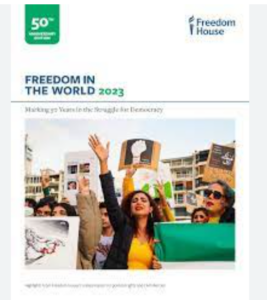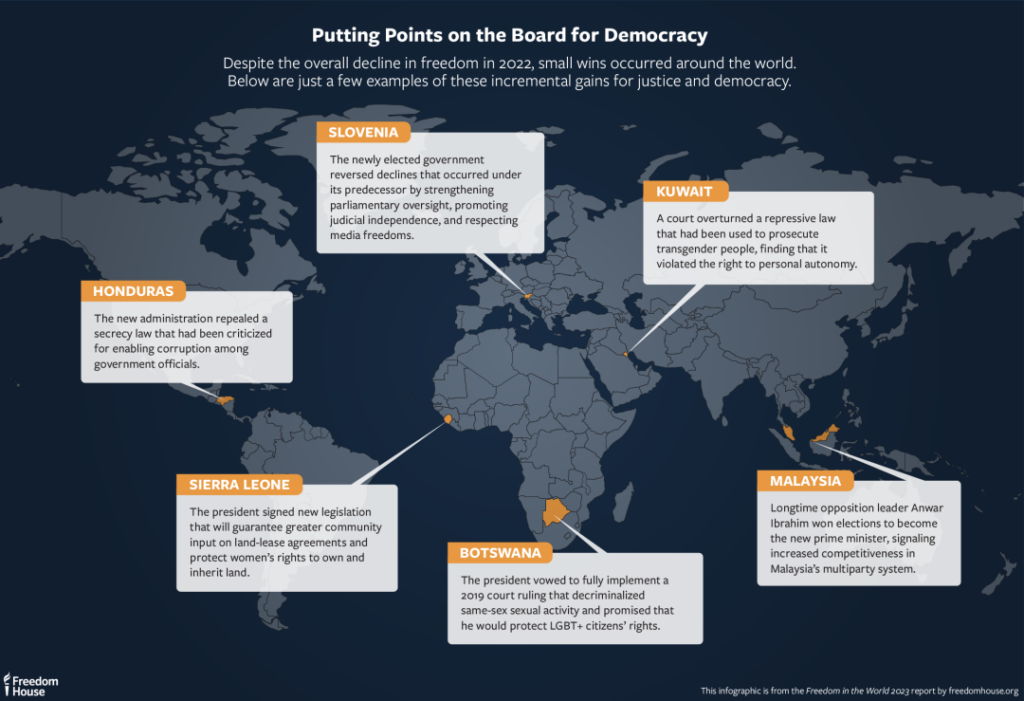 Democracy regressed globally for the 17th consecutive year, but the pace of that decline has slowed and the world could be approaching a “turning point,” according to “Freedom in the World 2023.”
Democracy regressed globally for the 17th consecutive year, but the pace of that decline has slowed and the world could be approaching a “turning point,” according to “Freedom in the World 2023.”
The survey finds that the gap between the number of countries where freedom has improved and where it has declined is at its narrowest in 17 years, notes NPR. Freedom declined in 35 countries, including Nicaragua and Tunisia, and improved in 34 countries, such as Kenya and Kosovo – the narrowest gap since the global democratic downturn began in 2005. By contrast, in 2020, 73 countries experienced declines, while 28 saw improvement.
“The most serious setbacks for freedom and democracy were the result of war, coups, and attacks on democratic institutions by illiberal incumbents,” the report said, singling out Russia’s authoritarian regime for launching an invasion of Ukraine “in a bid to scuttle that country’s hard-won democratic progress.”
The authors, Yana Gorokhovskaia and Adrian Shahbaz, today presented the key findings at a panel discussion (above) with the Hon. Jane Harman, chair of the Freedom House Board; Michael J. Abramowitz, president of Freedom House; Nury Turkel, chairman of U.S. Commission on International Religious Freedom; Venezuelan democracy activist Leopoldo López; Dr. Rachel Kleinfeld, senior fellow at the Carnegie Endowment for International Peace; Alicia Phillips Mandaville, VP for Policy and Evaluation at the Millennium Challenge Corporation (MCC).

The rise of authoritarianism and the erosion of democracy continued in 2022, but the authors found cause for optimism. Despite many setbacks, there “were signs during the past year that the world’s long freedom recession may be bottoming out,” they wrote:
- Countries like Colombia, Kenya and Malaysia had peaceful transfers of power following contentious elections, while several states that had cracked down on free speech and assembly during the COVID pandemic loosened restrictions.
- On the downside, global media freedom continued its disturbing decline; there were multiple coups in West Africa; and leaders from Peru to Tunisia attempted power grabs with varying degrees of success.
- Colombia and Lesotho moved from partly free to free, while Peru dropped to partly free and Burkina Faso to not free.
- Finland, Norway and Sweden received perfect scores, while North Korea, Eritrea, Turkmenistan, South Sudan, Syria and Tibet were the least free, and China and Saudi Arabia also ranked among the “worst of the worst.”
Another mildly cheering fact is that if you take a slightly longer view, the world is still ahead of where it was 50 years ago, The LA Times’s Nicolas Goldberg adds. As Adrian Shahbaz, Freedom House’s vice president for research, pointed out, when the first “Freedom in the World” report appeared in 1973, 44 countries out of 148 were rated “free” — or 30%. Today 84 countries out of 195, or 43%, are “free.”
 To reverse adverse trends, democracies cannot be silent about the authoritarian behaviors of regimes and advance a democratic agenda in their bilateral relationships, argues Yana Gorokhovskaia, Freedom House Director for Research, Strategy and Design. Governments and civil society must also dramatically ramp up support for groups and individuals on the front lines of defending freedom, whether in Ukraine, Iran, El Salvador, or Thailand, she adds.
To reverse adverse trends, democracies cannot be silent about the authoritarian behaviors of regimes and advance a democratic agenda in their bilateral relationships, argues Yana Gorokhovskaia, Freedom House Director for Research, Strategy and Design. Governments and civil society must also dramatically ramp up support for groups and individuals on the front lines of defending freedom, whether in Ukraine, Iran, El Salvador, or Thailand, she adds.
The democratic transformation that swept the globe during the late 20th century succeeded because of the courage and tenacity of local activists, and the embrace of freedom’s cause in the diplomacy of free countries, most importantly the United States, Abramowitz and Puddington write for The Post. There will be no breakthrough today without a similar commitment of solidarity from the world’s democracies.
Are we approaching a turning point? #FreedomInTheWorld 2023 documented the narrowest gap between score improvements & declines since we first noted global democratic regression 17 years ago. 35 countries’ scores declined overall while 34 improved.
🔗: https://t.co/11R0g99fFm pic.twitter.com/E7hyElhL3j
— Freedom House (@freedomhouse) March 9, 2023
The report was made possible by the generous support of Google, Inc., The Hurford Foundation, Jyllands-Posten Foundation, Lilly Endowment Inc., the Merrill Family Foundation, and the National Endowment for Democracy (NED).
There will be no democratic breakthrough without solidarity akin to the late 20th century’s tenacious local activists & embrace of freedom’s cause in democracies’ diplomacy, @freedomhouse‘s @Abramowitz & #ArchPuddington write @washingtonpost https://t.co/U2dBeCTDUd
— Democracy Digest (@demdigest) March 9, 2023







